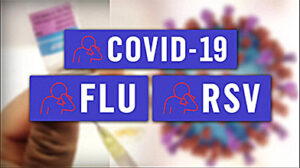 U.S. doctors are warning that a surge in cases of respiratory syncytial virus (RSV) is coinciding with an increase in COVID transmission and an earlier-than-normal flu season, raising the specter of a “tripledemic” of respiratory illness this winter.
U.S. doctors are warning that a surge in cases of respiratory syncytial virus (RSV) is coinciding with an increase in COVID transmission and an earlier-than-normal flu season, raising the specter of a “tripledemic” of respiratory illness this winter.
In particular, RSV infections among young children are reportedly filling some U.S. hospitals to capacity.
WHO IS AT RISK?
Infants are most at risk from RSV because they often cannot cough up the secretions caused by the virus and may need airway suctioning or intravenous fluids. Some may need extra oxygen. Older children and most adults typically experience mild, cold-like symptoms.
On average, RSV leads to 58,000 hospitalizations among children under age 5 and 177,000 hospitalizations among adults age 65 and older each year, according to the U.S. Centers for Disease Control and Prevention.
RSV deaths are rare in U.S. children, but 14,000 adults die annually from the virus, with older or immunocompromised individuals at greatest risk, the CDC said.
WHAT CAN PREVENT RSV?
Infection with RSV can be prevented in the same way one would ward off any virus: staying away from people who are sick, ensuring the best possible ventilation when you are indoors, wearing a high-quality mask, and keeping your hands as clean as possible, said Dr. Jay Varma, Chief Medical Adviser at Kroll.com and Director of the Weill Cornell Center for Pandemic Prevention and Response.
There is no vaccine against RSV, although Pfizer Inc. is developing RSVpreF for adults. In the meantime, it is important “for everyone to get up to date on their COVID and flu vaccines,” Varma said.
The CDC says it cannot yet predict when the previous seasonal patterns will return.
(Reprinted from Reuters)


